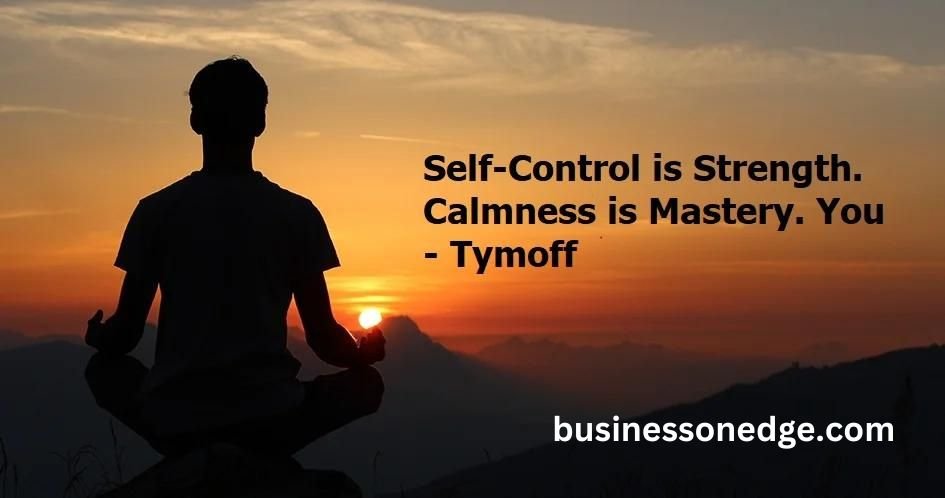Table of Contents
Introduction
In a world that pulls us in different directions, self-control and staying calm under pressure are strengths. Self-Control Is Strength. Calmness Is Mastery. You – Tymoff – shows how these qualities can affect our lives.
Self-control and calmness are about controlling your emotions and making good decisions. When you develop these qualities, you can deal with everyday challenges and big pressures well.
Key Points to Explore:
- The definition of self-control and calmness: Self-control is about controlling your emotions and behaviour to achieve long-term goals. Calmness is about staying calm in difficult situations.
- Importance today: In today’s world, self-control and calmness are important for success.
- The phrase: “Self-control is strength.” Calmness is mastery. You – Tymoff is a reminder to harness your inner powers.
This introduction looks at the ideas of self-control and calmness. It explains how you can use these ideas to improve your life. If you understand and accept these strengths, you can meet the present demands and create a better future.
The Science Behind Self-Control Is Strength. Calmness Is Mastery. You – Tymoff
Self-control is a complex psychological trait that researchers have studied. It involves the brain’s prefrontal cortex, which controls things like planning, decision-making, and social behaviour. Good self-control lets people wait for something better in the future, which helps them in areas like health, money and relationships.
Facts and figures:
- Children who are more in control are more likely to have a good life as adults.
- You can train your self-control, just like you can train a muscle.
Case Study:
The Marshmallow Test: A famous experiment by psychologist Walter Mischel where children were given the choice between one marshmallow or two if they could wait 15 minutes. Children who waited had better lives.
Self-control is good for you.
- Your health will improve. Easier to manage diet and exercise.
- Money: More savings and better planning.
- Relationships: Better relationships.
Knowing you can improve your self-control is empowering. It shows you can achieve more in life.
Mastering Calmness in a Chaotic World
Calmness is a way of thinking that helps you handle stress. Mastering calmness helps you think clearly, react thoughtfully, and stay focused under pressure.
Strategies for Staying Calm:
- Meditation: Practice makes stress and anxiety go away.
- Breathing exercises: These can quickly reduce stress.
- Scheduled rest time. Take time to rest when you’re busy.
The benefits of calmness:
- Less stress and anxiety: Calm people have lower stress hormones.
- Better decision-making: Calmness makes you think more clearly.
- Improved productivity: Less stress means more energy for productive activities.
If you do these things every day, you will feel better and be healthier.
Self-Control and Calmness in Relationships: Building Strong Bonds
Good communication and conflict resolution depend on self-control and calmness. These qualities help you listen more carefully, think before you speak, and interact with others in a positive way.
Tips for Enhancing Relationships through Self-Control and Calmness:
- Listen actively: Listen without planning what to say.
- Think before you speak: Think before you speak. This helps you avoid hurting others.
- Speak clearly about your needs: Speak calmly and clearly about your needs and feelings.
These practices make relationships stronger. If you can control yourself and stay calm, you’ll connect better with others.
Cultivating Self-Control and Calmness: Practical Exercises and Daily Habits
Practice makes perfect. Doing specific exercises and habits every day helps you develop these skills.
Daily Practices:
- Set clear goals: What do you want to achieve with your self-control efforts?
- Keep a journal: Keep track of how you’re doing with self-control and calmness.
- Mindfulness practice: Do mindfulness exercises to improve awareness and emotional control.
Tools to help:
- Meditation apps: Guided meditations are available on apps like Headspace and Calm.
- Habit trackers: Tools to help you form habits that help you control yourself.
These practices help in the short term and change the way your brain works, making it easier to handle challenges and stress.
Overcoming Challenges: When Self-Control and Calmness Are Tested
Even the most disciplined people have moments when they need to control themselves. Knowing what to expect can help you stay calm and strong.
Common challenges:
- High-stress situations: Unexpected events or high stakes can make even the calmest person nervous.
- Emotional Triggers: People can make you feel strong emotions.
How to stay calm:
- Know what makes you stressed: Knowing what makes you stressed helps you prepare and react.
- Seek support: Sometimes, talking to a friend or mentor can help.
Conclusion
Mastering self-control and calmness is a lifelong journey. It takes commitment, practice and willingness to learn and adapt. Embrace the principles in this post and you’ll see improvements in all areas of your life.
Final Thoughts:
- Think about how far you’ve come: Think about how you’ve improved and what you still need to work on.
- Set new goals: As you get better, set new challenges.
These qualities will not only make your life better, but also help those around you. Self-control is strength. Calmness is mastery. You – Tymoff is a roadmap to a more disciplined, fulfilling life.
Read More : do alec and kaleb get paid for commercials


